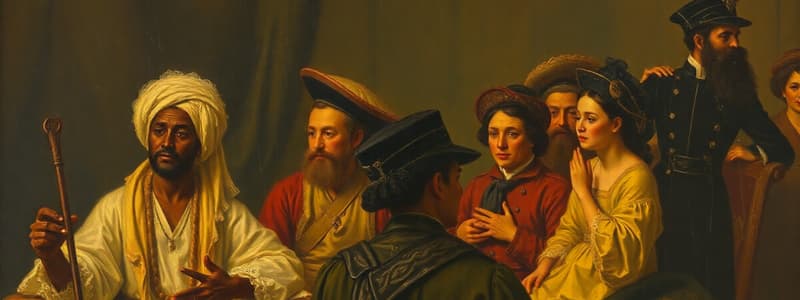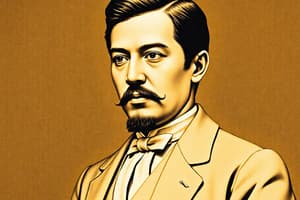Podcast
Questions and Answers
What was the primary focus of Module 2 in the course on Jose Rizal?
What was the primary focus of Module 2 in the course on Jose Rizal?
- Rizal's family background and upbringing
- The economic, social, cultural, and political developments of the 19th century (correct)
- The literary works of Jose Rizal
- The impact of colonial powers on the Philippines
Which activity is primarily focused on engaging participants in recalling historical events?
Which activity is primarily focused on engaging participants in recalling historical events?
- Warm-up Activity (correct)
- Assessment
- Application
- Readings
What is the total estimated time to complete all activities in Module 2?
What is the total estimated time to complete all activities in Module 2?
- 240 minutes
- 480 minutes
- 300 minutes
- 360 minutes (correct)
How long is the assigned reading section in Module 2?
How long is the assigned reading section in Module 2?
What is the duration allocated to the 'Application' activity in Module 2?
What is the duration allocated to the 'Application' activity in Module 2?
Which reading is listed as part of the course content for Module 2?
Which reading is listed as part of the course content for Module 2?
What kind of worksheet is included in the Application section of Module 2?
What kind of worksheet is included in the Application section of Module 2?
Which aspect is emphasized regarding the 19th century in Module 2?
Which aspect is emphasized regarding the 19th century in Module 2?
What was a primary concern of liberalism during the industrial revolution?
What was a primary concern of liberalism during the industrial revolution?
What notable period does the time frame 1775-1875 indicate in relation to nationalism and republicanism?
What notable period does the time frame 1775-1875 indicate in relation to nationalism and republicanism?
How did nationalism manifest in the context of the Philippines during the industrial revolution?
How did nationalism manifest in the context of the Philippines during the industrial revolution?
What role did the Catholic Church play in relation to the state and society during this period?
What role did the Catholic Church play in relation to the state and society during this period?
Which of the following best describes the concept of democracy in the discussed context?
Which of the following best describes the concept of democracy in the discussed context?
How did liberalism affect social structure in the countries with feudal restraints?
How did liberalism affect social structure in the countries with feudal restraints?
What characterized the relationship between liberalism and the Catholic Church during this period?
What characterized the relationship between liberalism and the Catholic Church during this period?
What was a common goal shared by the Filipino middle class who traveled to Europe?
What was a common goal shared by the Filipino middle class who traveled to Europe?
What was the predominant social structure in the 19th century Philippines?
What was the predominant social structure in the 19th century Philippines?
Who appointed the Governor-General of the Philippines during Spanish rule?
Who appointed the Governor-General of the Philippines during Spanish rule?
What was one major factor that influenced the development of national consciousness among Filipinos during the 19th century?
What was one major factor that influenced the development of national consciousness among Filipinos during the 19th century?
What authority did the Governor-General have concerning legislative powers?
What authority did the Governor-General have concerning legislative powers?
Which class was included in the body that elected the chief executive of a town?
Which class was included in the body that elected the chief executive of a town?
What role did the Ministro de Ultramar play in the governance of the Philippines?
What role did the Ministro de Ultramar play in the governance of the Philippines?
Which statement best describes the economic conditions in the 19th century Philippines?
Which statement best describes the economic conditions in the 19th century Philippines?
What was a significant impact of Spanish censorship practices in the 19th century Philippines?
What was a significant impact of Spanish censorship practices in the 19th century Philippines?
What was the primary purpose of the bandala collected from the natives?
What was the primary purpose of the bandala collected from the natives?
What characteristic was notably absent in the educational system during Spanish rule?
What characteristic was notably absent in the educational system during Spanish rule?
Which of the following describes rote learning as practiced in schools?
Which of the following describes rote learning as practiced in schools?
The friars played a dominating role in education primarily due to the emphasis on what subject?
The friars played a dominating role in education primarily due to the emphasis on what subject?
What impact did the educational practices have on the Filipinos according to the content?
What impact did the educational practices have on the Filipinos according to the content?
What essential element of academic freedom is emphasized in the educational system?
What essential element of academic freedom is emphasized in the educational system?
In the context of the 19th century, what led to the rise of nationalism in the Philippines?
In the context of the 19th century, what led to the rise of nationalism in the Philippines?
What was the role of fear and obedience in the educational system under the friars?
What was the role of fear and obedience in the educational system under the friars?
What was one of the significant impacts of the Spanish colonial rule on the Filipino people?
What was one of the significant impacts of the Spanish colonial rule on the Filipino people?
Which factor was NOT listed as a common cause of revolts against Spanish rule?
Which factor was NOT listed as a common cause of revolts against Spanish rule?
What major policy employed by the Spaniards hindered the unity of the Filipino people?
What major policy employed by the Spaniards hindered the unity of the Filipino people?
How did industrialization affect the Philippines during the Spanish colonial period?
How did industrialization affect the Philippines during the Spanish colonial period?
What was a consequence of the opening of the Suez Canal for the Philippines?
What was a consequence of the opening of the Suez Canal for the Philippines?
Which of the following was a limitation faced by earlier revolts against Spanish colonial rule?
Which of the following was a limitation faced by earlier revolts against Spanish colonial rule?
What legacy did Spanish rule leave in terms of religion in the Philippines?
What legacy did Spanish rule leave in terms of religion in the Philippines?
Which cultural influence preceded the arrival of the Spaniards in the Philippines?
Which cultural influence preceded the arrival of the Spaniards in the Philippines?
Study Notes
Overview of Module 2
- Examines economic, social, cultural, and political developments in the 19th century influencing Rizal's nationalism.
- Highlights consultation hours for student support.
Course Content Structure
- Activities include warm-ups, readings, lectures, application exercises, and assessments.
- Total time commitment: 360 minutes.
Historical Context of Rizal
- 19th century marked by:
- Industrial Revolution impacting the Philippines.
- Emergence of democracy, liberalism, and nationalism.
- Changing political and social landscapes spurred the rise of a national consciousness among Filipinos.
Key Philosophies and Movements
- Nationalism: Advocated for independence and the love of one's country.
- Liberalism: Focused on personal freedom, social progress, individual rights, and anticlery to promote secular governance.
- Socialism: Gaining traction in Europe, appealing among Filipino intellectuals exposed to democratic ideals.
Role of the Catholic Church
- Powerful institution with historical ties to European monarchies.
- Viewed as an obstacle to reforms in emerging republics, influencing Philippine governance.
- Contributed to the oppressive climate against Filipino aspirations for rights and reforms.
19th Century Philippine Society and Governance
- Predominantly feudalistic structure benefitting Spaniards.
- Governed by the Minister of Ultramar in Madrid; the Governor-General executed significant power:
- Issued laws and orders, controlling ecclesiastical and financial matters.
- Managed local governance with limited representation.
Educational System Challenges
- Focused heavily on religious instruction with inadequate academic freedom.
- Outdated teaching methods contributed to a lack of intellectual growth.
- Prejudicial attitudes against Filipino students limited educational opportunities.
Birth of Filipino National Consciousness
- Emergence during the 19th century, rooted in:
- Pre-Hispanic identity and cultural development.
- The impact of prolonged Spanish rule fostering a desire for independence.
- Collective aspirations for national unity driven by shared heritage and struggles against oppression.
Causes and Effects of Revolts
- Common grievances included:
- Forced labor exploitation and onerous taxation (e.g., bandala).
- Desire for religious freedoms and local governance.
- Revolts often unsuccessful due to lack of unity and effective leadership.
Impact of Industrialization
- Industrial advancements enhanced communication and trade.
- The opening of the Suez Canal connected the Philippines to international markets.
- Resulted in economic growth, improved living standards, and educational opportunities, integrating the Philippines into global commerce.
Overall Impact on Rizal's Nationalism
- Rizal's ideals shaped by contemporary movements toward democracy and independence.
- His experiences were heavily influenced by the socio-political conditions of 19th century Philippines, fostering a robust national identity among Filipinos.
Studying That Suits You
Use AI to generate personalized quizzes and flashcards to suit your learning preferences.
Description
This quiz explores the economic, social, cultural, and political developments of the 19th century that influenced José Rizal's nationalism. Topics include liberalism, socialism, and the impact of the Industrial Revolution on the Philippines. Students will engage in various activities to deepen their understanding of these historical contexts.




